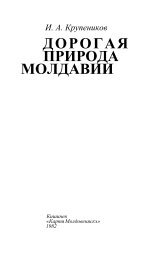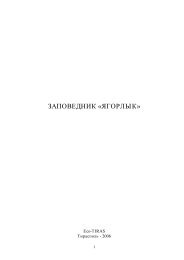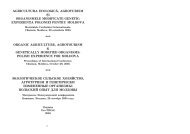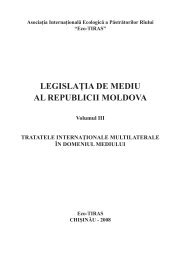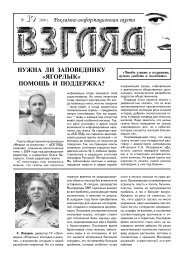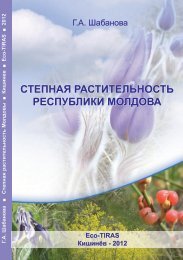Stages of the policy and planning process Problem setting Institutional settingProblem definition• Actors/stakeholders• Dimensions of problem• Problem theory (recourse use/state)• Future outlook/time horizonPolicy/plan formulation• Actors/stakeholders (formal/informal)• Goals, objectives, targets• Solution devised• Means proposedPolicy evaluation• Evaluation criteriaPolicy/plan implementation• Actors/stakeholders (formal/informal)• Implementation procedures• Enforcement• Coordination• Effectiveness (social acceptance, resource availability)ResourcesResourcesrequirementsby activityActivitiesActors(formal and informal)&Resource regimesFormal constraints(Laws, rules, consultations)Informal constraints(Norms of behaviour,rules of conduct, social conventions)Environment characteristicsFig. 1. Methodological framework of the interactions at principal stages of a policy and planning process(Adapted from: Briassoulis, 2004)lations and interests in particular activity-resource combinationsdetermine which goals, objectives and targetsare promoted actually for the problem solution, and whichtheory is adopted. Moreover, because by the time theproblem reaches this stage the physical setting may havechanged, the problem for which policies and plans areformulated may not coincide with that originally defined.The devised solutions result from the interactions between,on the one hand, the physical structure and spatiallevel of the problem setting and, on the other, the actorsinvolved, effective resource regimes, technology, availableinformation and scientific knowledge, the presence ofuncertainty and the broader policy and non-policy context.The influence of resource regimes is most evident at thisstage; resource users promote problem solutions compatiblewith their ownership and rights. Well-establishedresource regimes, such as land property, will produce betterdefined solutions because the rules of the game areclearer and less uncertain. In contrast, the poorly-definedor non-existent regimes at a certain spatial level will generatemore uncertain solutions or no solutions leading toneglecting, overusing or free-riding of certain resourcesthat may cause their damage. Proposed solutions may requirethe establishment of new resource regimes, wherenone exists. Extant resource regimes may also influencethe types of solutions promoted and whether these aretechnological or non-technological.Because of institutional interplay, solutions at onespatial level will bear the influence of regimes at higherlevels and affect regimes at the lower. For example, localwater use observing the national water laws has also toconform to supra-national regulations and respect the waterrights of neighboring areas. The spatial fixity of mostenvironmental resources produces a keen competitionamong potential users with incompatible interests andamong conflicting uses requiring the same resource simultaneouslyand contemporaneously. Thus, in achievingthe desired goals, the key challenges facing the design ofsolutions are a need for spatial co-ordination and optimalcombination of preferred activities. Combining mitigationand adaptation activities in confronting climate change isa classical example of the latter.Summarizing the policy/plan formulation stage,Briassoulis (2004) noted that formal and informal actors(usually the most powerful) conceive policies according totheir particular interests but not according to intrinsic characteristicsof environmental resources. Design principlesare rarely holistic from the viewpoint of resources andserve the needs of activity-related interests. Accordingly,the proposed solutions very rarely account for other actorsand for the relationships among all resources in a problemsetting. The end result is that the use of otherwiseindivisible resources is functionally compartmentalizedand becomes subject to different regimes and competentorganizations. Nevertheless, “The spatial co-ordination ofresource use and of the required means, congruent withenvironmental carrying capacity limits, is rendered problematicif not infeasible. The advanced solutions inevitablyproduce unanticipated impacts, generate winners andlosers, jeopardize the possibility of integrated resourcemanagement and, eventually, of sustainable development”(Briassoulis, 2004, p. 123).Policy/Plan Evaluation outcomes hinge crucially onthe assumptions, logic and approach to evaluation as wellas on the criteria adopted. They all are determined by the‘evaluators’ and extant resource regimes. As result, onlyselected aspects of activities and resources are evaluatedwith conflicts arising when pro-conservation and pro-developmentinterests have opposing preferences. The resourceregimes may introduce an evaluation bias if they donot emphasize a resource’s all aspects and functions; theevaluation may not account holistically for interrelationshipsamong resources and activities. Higher-level resource regimes,e.g. international treaties, may suggest criteria thatare too general or irrelevant for lower levels. The obsoleteregimes may prove useless, if not irrelevant, for evaluatingcontemporary policies and plans resulting in the evaluationthat reflects the socio-political biases.Policy/Plan Implementation. The institutional complexityis highest and its implications are most obviousat the policy and plan implementation stage. This activitydepends heavily on ‘implementers’ that include policymakers, formal policy implementers, intermediaries, lobbiesand other constituency groups, policy recipients,— 111 —
mass media, etc., which belong to different organizationsand operate at various spatial levels. Moreover, some ormost of them may not have participated in the activities atthe previous stages. Their participation and effectivenessdepend on their official roles, interests in the problem situationand informal rules of conducting. The patterns ofinteractions among implementers during implementationare not always formally established or clear, frequentlyevolving into either co-operation or rivalry. Lack of coordinationamong resource regimes and implementingorganizations as well as among implementation proceduresis common because of the interest-led characterof policy/plan formulation. Implementation effectivenessdepends critically on availability of means, optimal combinationand co-ordination as well as on the enforcement ofpolicy/plan provisions – the requirements that are rarelymet in practice. “Enforcement depends crucially on thesocial acceptance of proposed solutions, the systems offormal and informal sanctions and provided rewards, andthe compliance culture of recipients. Implementers whodisagree with proposed solutions or with procedures thatdiffer from their customary practices will most probablynot observe policy or plan prescriptions, or they will ‘bendthe official rules’ and use available means for other purposes.This is particularly crucial at the level of the actualresource users”, – Briassoulis (2004, p. 124) concluded.Extensive discussions about sustainable developmenthave brought sharply the subject of renewableresource management. Undoubtedly, if the process ofdevelopment is to be sustainable, then essential renewableresources, including those considered as drivers ofclimate change, need to be optimally managed. However,despite even the best efforts, these resources may still hita crisis state.A key goal of renewable resource managers is to takeactions to ensure that the resource being managed staysaway from irreversible or crisis states, in which it providesneither consumptive nor non-consumptive services to humans(Batabyal and Beladi, 2006). This statement is especiallyimportant for developing countries and some countriesin transition that are largely agrarian (for example,Moldova). These countries are significantly dependent onrenewable natural resources, and particularly those thatare inherit in their local environment (e.g. soil, water, pasture,grasslands, etc.). Given the nature and the extent ofthis dependence, the optimal management of renewableresources is an extremely important policy objective.Time, taken for a renewal, provides information aboutthe character of a resource. If, depending on the existingstock, a resource can renew itself within decision-makingperiods, it is relevant to humans without targeted humanintervention. A renewable resource can exist in a finitenumber of states, some of which are desirable, others– undesirable, and some of the latter are likely to be irreversible.In these irreversible or crisis states the resourceis so degraded or transformed that (no matter how hard tomanage it) its return into origin or more favourable state isimpossible. The objective of renewable resource managementin maximizing the amount of time a resource spendsin the desirable set of states, or in minimizing the amount itspends in the undesirable—but not the irreversible—set ofstates (Batabyal and Beladi, 2006).ReferencesBatabyal A.A. and H. Beladi, 2006: Renewable ResourceManagement in Developing Countries: How Long Until Crisis? Reviewof Development <strong>Eco</strong>nomics, 10(1): 103–112Batchelor, C.H., 1995: Water Resources Management andAgricultural Production in the Central Asian Republics. Report on anAgro-Hydrological Consultancy to Sub-Project 7 of the WARMAPProject, June 1995, Institute of Hydrology, Oxford.Briassoulis H., 2004: The Institutional Complexity of EnvironmentalPolicy and Planning Problems: The Example of MediterraneanDesertification. Journal of Environmental Planning and Management,47(1): 115–<strong>13</strong>5.Cain J., C. Batchelor, D. Waughray, 1999: Belief networks:A framework for the participatory development of natural resourcemanagement strategies. Environment, Development and Sustainability1: 123–<strong>13</strong>3Millennium <strong>Eco</strong>system Assessment, 2005: <strong>Eco</strong>systems andHuman Well-being—Synthesis. Island Press, Washington, DC. [http://www.millenniumassessment.org/documents/document.356.aspx.pdf].Noorbakhsh F. and S. Ranjan, 1999: A model for sustainabledevelopment: integrating environmental impact assessment and projectplanning. Impact Assessment and Project Appraisal, 17(4): 283–293Varone F., Reynard E., Kissling-Nбf I., Mauch C., 2002: InstitutionalResource Regimes: The Case of Water Management in Switzerland.Integrated Assessment 3(1): 78-94.Walker, B.: 2006: A Resilience Approach to Integrated Assessment.The Integrated Assessment Journal, (IAJ), Bridging Sciences & Policy5(1): 77–97.ЭНТОМОФАУНА КИЦКАНСКОГО ЛЕСА КАК ОБЪЕКТ ИЗУЧЕНИЯВ ПЕРИОД ПОЛЕВЫХ ПРАКТИК (1993–2010 гг.) ДЛЯ СТУДЕНТОВ-БИОЛОГОВЛ.В. Котомина, С.С. ШешницанПриднестровский государственный университет им. Т.Г. ШевченкоFAUNA OF KITSKANY FOREST’S INSECTS AS AN OBJECT OF STUDY DURINGTHE FIELD PRACTICE (1993–2010) FOR THE STUDENTS OF BIOLOGYL.V. Kotomina, S.S. SheshnitsanField practice on zoology of invertebrates play defining role in formation of the biologist. Many years the basic place for the practice is Kitskanyforest. In article data are resulted about rare and usual species of forest’s entomofauna on the basis of gathering of students. The factors negativelyaffecting a biodiversity of insects of the forest are specified.Полевые практики по зоологии беспозвоночныхиграют определяющую роль в подготовке специалиста-биолога.В процессе их прохождения будущий специалистне только закрепляет полученные на лекционныхи лабораторно-практических занятиях знания, но иприобретает необходимый минимум навыков полевыхисследований для будущей самостоятельной работы.Лекционные и лабораторно-практические занятия,— 112 —
- Page 3 and 4:
Descrierea CIP a Camerei Nationale
- Page 5 and 6:
Уважаемые коллеги,
- Page 7 and 8:
щегосударственной
- Page 9 and 10:
доме, в котором мы в
- Page 11 and 12:
шие глубины на заде
- Page 13 and 14:
с малыми восстанов
- Page 15 and 16:
Литература1. Жадин
- Page 17 and 18:
Рис. 3. Многолетняя
- Page 19 and 20:
тера и глубины изме
- Page 21 and 22:
ПОДДЕРЖАНИЕ БИОРАЗ
- Page 23 and 24:
Таблица 5. Оптималь
- Page 25 and 26:
Таблица. Результат
- Page 27 and 28:
ФОРМИРОВАНИЕ БИОЦЕ
- Page 29 and 30:
Подавляющее больши
- Page 31 and 32:
Рис.1. Днестр вблизи
- Page 33 and 34:
сопоставимости дан
- Page 35 and 36:
ции с международны
- Page 37 and 38:
А.Н. Бургеля, К.П. Бу
- Page 39 and 40:
Выводы1. Уже на само
- Page 41 and 42:
тегории, виды и пор
- Page 43 and 44:
санитарно-эпидемио
- Page 45 and 46:
Таблица 4. Распреде
- Page 47 and 48:
реационных, монито
- Page 49 and 50:
Шабановой Г.А. и Кух
- Page 51 and 52:
могут быть убраны,
- Page 53 and 54:
Турунчук. Связь с с
- Page 55 and 56:
Праздник «День Рек
- Page 57 and 58:
500ЈPРис. Распределе
- Page 59 and 60:
Н. Гроссу * , Р. Шакир
- Page 61 and 62: Рис.1. Помесячное ра
- Page 63 and 64: Calitatea apei r. Nistru conform gr
- Page 65 and 66: Карта геохимическо
- Page 67 and 68: лесу был дуб, сегод
- Page 69 and 70: При предварительно
- Page 71 and 72: щих улучшить социа
- Page 73 and 74: ней опасных загряз
- Page 75 and 76: ФотоприложениеФот
- Page 77 and 78: в Украине - одесска
- Page 79 and 80: тия по гидрохимиче
- Page 81 and 82: ветствующих санита
- Page 83 and 84: ния полей, так и для
- Page 85 and 86: В. Экономический ан
- Page 87 and 88: Таким образом, плат
- Page 89 and 90: Рис. 2. Динамика нор
- Page 91 and 92: Табл. 1а. Статистиче
- Page 93 and 94: Выводы1. Наибольшее
- Page 95 and 96: Для днестровской в
- Page 97 and 98: ЭКОЭТИЧЕСКОЕ ВОСПИ
- Page 99 and 100: Таблица 1. Валовое с
- Page 101 and 102: почвенный покров п
- Page 103 and 104: always been the public concern of b
- Page 105 and 106: и уникальными по си
- Page 107 and 108: ются основными фак
- Page 109 and 110: Рис. 4. Пораженность
- Page 111: ight to use”. Varone et al. (2002
- Page 115 and 116: В связи с тем, что К
- Page 117 and 118: период поездки вых
- Page 119 and 120: doutchinae (d’Orb.), выше з
- Page 121 and 122: вместе с осадками в
- Page 123 and 124: Таблица 4. Содержан
- Page 125 and 126: efectuat în baza următorilor indi
- Page 127 and 128: видуальных различи
- Page 129 and 130: - соответствующее з
- Page 131 and 132: ФАУНА КЛЕЩЕЙ ДРЕВЕ
- Page 133 and 134: Таблица 1. Данные ра
- Page 135 and 136: РЕКРЕАЦИОННЫЕ РЕСУ
- Page 137 and 138: ЭТАПЫ ЭВОЛЮЦИИ БИО
- Page 139 and 140: Плотина Дубоссарск
- Page 141 and 142: чимые. При этом «пе
- Page 143 and 144: Схематически получ
- Page 145 and 146: Таблица 5. Данные на
- Page 147 and 148: Risks for biodiversity with tested
- Page 149 and 150: 14. Ярошенко M.Ф., Дед
- Page 151 and 152: 20082009Fig. 2. Structure of shrew
- Page 153 and 154: с природой (различн
- Page 155 and 156: делить в их предела
- Page 157 and 158: Таблица. Оценка эне
- Page 159 and 160: лах Приднестровья
- Page 161 and 162: ВыводыКраеведческ
- Page 163 and 164:
вий среды жизнедея
- Page 165 and 166:
Senecio besserianus Minder. Cypripe
- Page 167 and 168:
Рис.1. Почвенная кар
- Page 169 and 170:
половины площади п
- Page 171 and 172:
Рис. 2. Современное
- Page 173 and 174:
ПРИЧИНЫ ГЕОМОРФОЛО
- Page 175 and 176:
RÂURILE MICI CU ŞANSE MARIDE A FI
- Page 177 and 178:
ЭКОНОМИКО-ЭКОЛОГИЧ
- Page 179 and 180:
прибрежной зоной (п
- Page 181 and 182:
Строительство в пр
- Page 183 and 184:
государственного у
- Page 185 and 186:
ческий, социальный
- Page 187 and 188:
ми, послужило весом
- Page 189 and 190:
губительно влияющи
- Page 191 and 192:
ных за контролем и
- Page 193 and 194:
PECULARITIES OF DYNAMICS OF PHOSPHO
- Page 195 and 196:
Fig. 4. Spatial and seasonal dynami
- Page 197 and 198:
• inventory of point discharges s
- Page 199 and 200:
СТЕРИЛИЗАЦИЯ КАК С
- Page 201 and 202:
гормоны (в незначит
- Page 203 and 204:
ПРОТОКОЛ ПО ПРОБЛЕ
- Page 205 and 206:
воды ежегодно умир
- Page 207 and 208:
РАЗРАБОТКА ПЛАНОВ
- Page 209 and 210:
ставляет материаль
- Page 211 and 212:
• Совершенствован
- Page 213 and 214:
«Алые паруса». Таки
- Page 215 and 216:
which the Committee is then require
- Page 217 and 218:
нием, культурой и х
- Page 219 and 220:
- Николаевская церк
- Page 221 and 222:
Сброшенный на 50 м б
- Page 223 and 224:
СТРУКТУРА ГЕОИНФОР
- Page 225 and 226:
4. Пространственная
- Page 227 and 228:
На фазе пика числен
- Page 229 and 230:
А.А. Тищенков, В.В. М
- Page 231 and 232:
Распределение видо
- Page 233 and 234:
цветковый (ККП, ЧКУ,
- Page 235 and 236:
очередной задачей
- Page 237 and 238:
схемой планировани
- Page 239 and 240:
эксплуатационным п
- Page 241 and 242:
ных дамб, с возвращ
- Page 243 and 244:
ледствия от урбани
- Page 245 and 246:
ОСНОВНЫЕ ФОРМЫ ДЕГ
- Page 247 and 248:
УЧАСТИЕ НЕПРАВИТЕЛ
- Page 249 and 250:
струкции как от сбр
- Page 251 and 252:
Рогоз широколистны
- Page 253 and 254:
Таблица 3. Изменени
- Page 255 and 256:
В рамках первых тре
- Page 257 and 258:
Основные экскурсио
- Page 259 and 260:
2. Кравченко Е.Н. При
- Page 261 and 262:
Decision-Maker user group are respo
- Page 263 and 264:
может ее запускать,
- Page 265 and 266:
поражения населени
- Page 267 and 268:
тию РДЮЦ «ГУТТА - кл
- Page 269 and 270:
мость разработки н
- Page 271 and 272:
Биология. Подорожн
- Page 273 and 274:
банизированных тер
- Page 275 and 276:
Результаты исследо
- Page 277 and 278:
площадь ассимиляци
- Page 279 and 280:
Рис. 3. Дендрограмма
- Page 281 and 282:
Рис.1. Сезонная дина
- Page 283 and 284:
Молдовы и Приднест
- Page 285 and 286:
Ребята приехали в 10
- Page 287 and 288:
Рис. 1. Численность
- Page 289 and 290:
жений, в том числе э
- Page 291 and 292:
[4]. Несомненно, выжи
- Page 293 and 294:
КОНСТИТУЦИОНАЛЬНА
- Page 295 and 296:
В настоящее время б
- Page 297 and 298:
8. Суворцева В.Ю., Ру
- Page 299 and 300:
Окончание табл. 2Ок
- Page 301 and 302:
содержаниеПРЕДИСЛ
- Page 303 and 304:
А.П. Погребняк, В.Ф.
- Page 305:
Научное изданиеБАС


![[download]13,2 Mb - Eco - Tiras](https://img.yumpu.com/50284532/113/500x640/download132-mb-eco-tiras.jpg)
